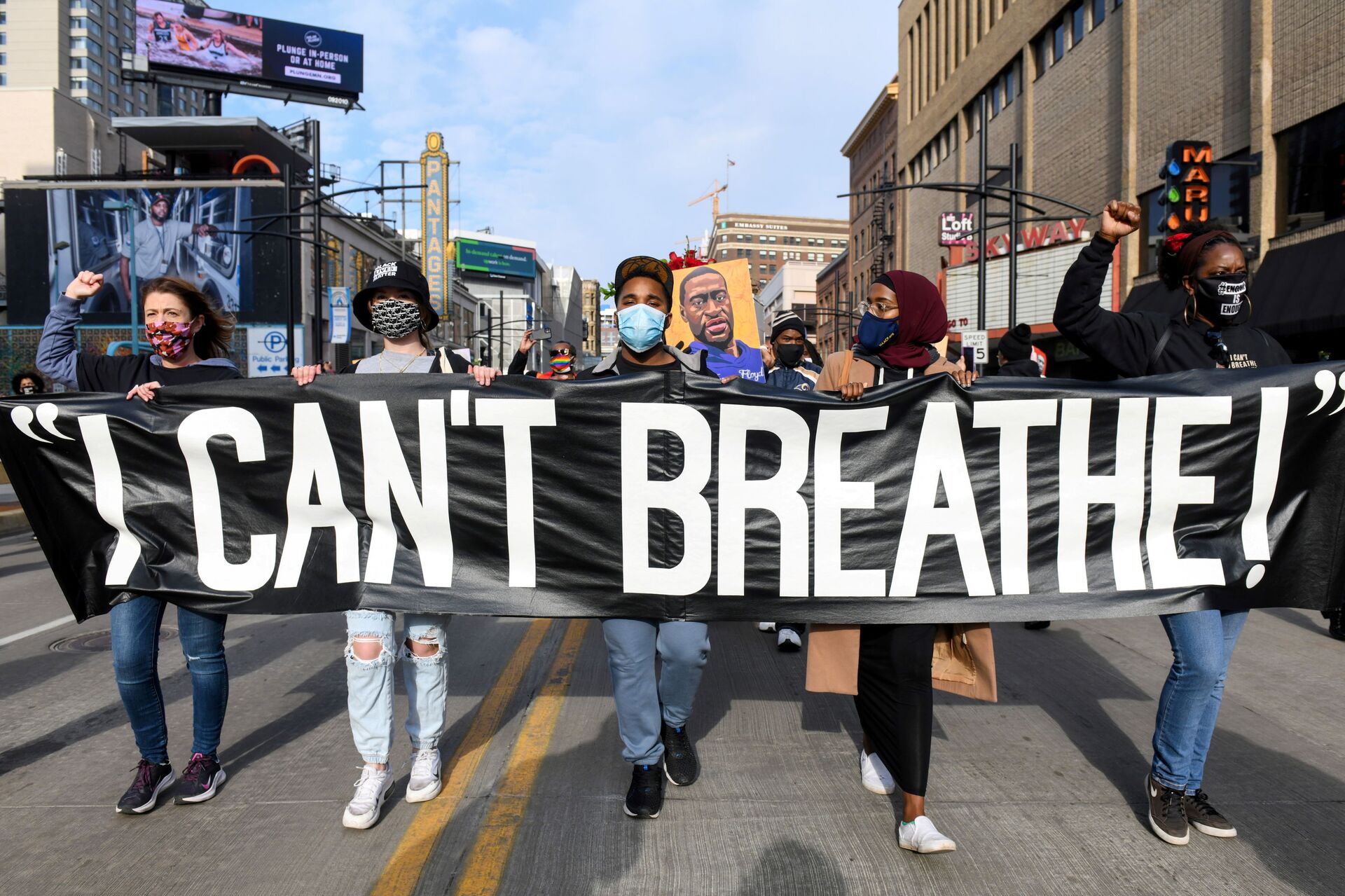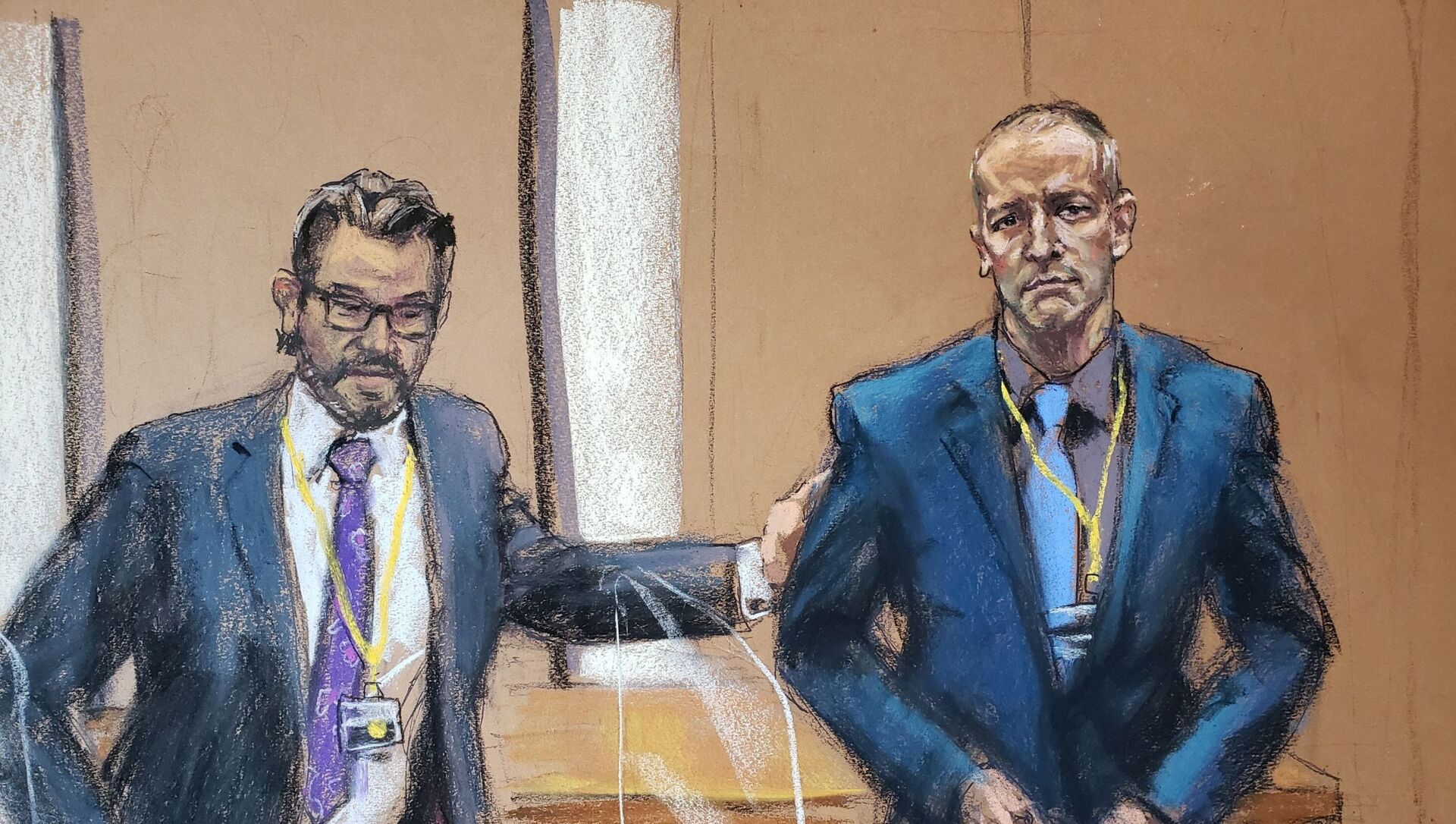Minneapolis Police Chief Medaria Arradondo testified on 5 April that under no circumstances should Chauvin have knelt on Floyd's neck after he stopped resisting, stressing that the now-fired cop "defied his own training and the department's mission of compassion" by continuing "to apply that level of force to a person proned out."
Still, the police chief admitted that at that time, the MPD allowed officers to use "conscious neck restraints" with "light to moderate" pressure.
Under cross examination, defence lawyer Eric Nelson asked Arradondo if he was familiar with "camera perspective bias." The chief said no. Then Nelson played two 30-second-long clips of Chauvin restraining the African American: bystander Darnella Frazier's video and police body cam footage from former officer Alexander Kueng. The footage indicated that from Kueng's angle the defendant's knee appeared to be on Floyd's shoulder blade, not on his neck, as paramedics arrived at the scene.
Defense counsel Eric Nelson discusses the concept of "camera perspective bias." Arradondo agrees that Chauvin's knee appears to be on Floyd's neck in the bystander video, but appears to be on his "shoulder blade" in the body-cam video. (Content may be disturbing to some viewers) pic.twitter.com/WxURy8nytS
— Alpha News (@AlphaNewsMN) April 5, 2021
"Would you agree that from the perspective of Officer Kueng’s body camera it appeared Officer Chauvin’s knee was more on Mr. Floyd’s shoulder blade?" asked the defence attorney. "Yes," Arradondo responded.
However, the prosecution immediately jumped in, arguing that the footage only features very limited period of time, although not challenging Nelson's views with regard to the 30-second clips.

Mechanical Asphyxia or Overdose?
Floyd died in police custody on 25 May 2020 after being accused of using a counterfeit $20 bill in a shop. Chauvin, who is believed to have kneeled on the man's for over nine minutes, is facing three charges: second-degree unintentional murder, third-degree murder, and second-degree manslaughter.
Testifying on Monday, Dr. Bradford Wankhede Langenfeld, who was the senior medical resident on duty at the time Floyd was transported to HCMC, stated that the black man did not have a heartbeat "sufficient to sustain life" upon the paramedics' arrival, adding that he believes that his patient's cardiac arrest was caused by a lack of oxygen – "asphyxia."
However, previously, Hennepin County Chief Medical Examiner Dr. Andrew Baker ruled that Floyd died of cardiac arrest. The state's criminal complaint against Chauvin said that the autopsy "revealed no physical findings that support a diagnosis of traumatic asphyxia or strangulation."
On 3 April, the Star Tribune drew attention to the fact that the prosecution hired at least six outside medical experts, including a forensic pathologist, to prove that Floyd died because of asphyxia when Chauvin knelt on his neck. Citing former attorneys, the newspaper suggested that the prosecution "appeared to draw a line between themselves and the medical examiner."
For its part, Chauvin's defence team highlighted that "Dr. Baker found none of what are referred to as the telltale signs of asphyxiation." In his opening statement Nelson argued that the African American's cardiac arrest was largely caused by drug use and pre-existing health issues, including heart disease and high blood pressure.
#DerekChauvin defense attorney Eric Nelson w/ an aggressive cross examination here, getting Dr Langenfeld to acknowledge that low oxygen levels & high Carbon Dioxide amounts found in #GeorgeFloyd consistent w/ fentanyl & other drug use.
— Paul Blume (@PaulBlume_FOX9) April 5, 2021
A detailed autopsy revealed a wide range of psychoactive substances in Floyd's system at the time of his death, including a mixture of methamphetamine and fentanyl. According to medical experts, the level of fentanyl found in his system could be fatal to some people.
I posted the autopsy on instagram and they added a disclaimer about COVID19 pic.twitter.com/ncUHAA9Sq1
— Jack Posobiec (@JackPosobiec) March 10, 2021
Testifying in the court on 1 April, Floyd's girlfriend, Courteney Ross, admitted that he had struggled with drug addiction since 2017. In March 2020, she even drove him to the emergency room because he was suffering from extreme stomach pain due to an overdose. A store clerk told the court on 31 March 2021 that Floyd "appeared to be high" when he handed over a counterfeit $20 bill.
The police body camera footage shown by Fox News host Tucker Carlson on 11 March 2021 indicates that Floyd was out of control on the day of his arrest, had foam around his mouth, and started saying that he "can't breathe" long before he was put to the ground. The pundit suggested that this condition could have been caused by a fentanyl overdose which is characterised by "slowed or stopped breathing." Still, the case is highly politicised and Chauvin may not get a fair trial, Carlson presumed.
Earlier, the US press reported, citing Minnesota locals, that Chauvin's acquittal or even "anything under a 10-year sentence" would unleash hell on Minneapolis, which was engulfed by Black Lives Matter riots along with other American cities in the summer of 2020 in the wake of Floyd's death.




